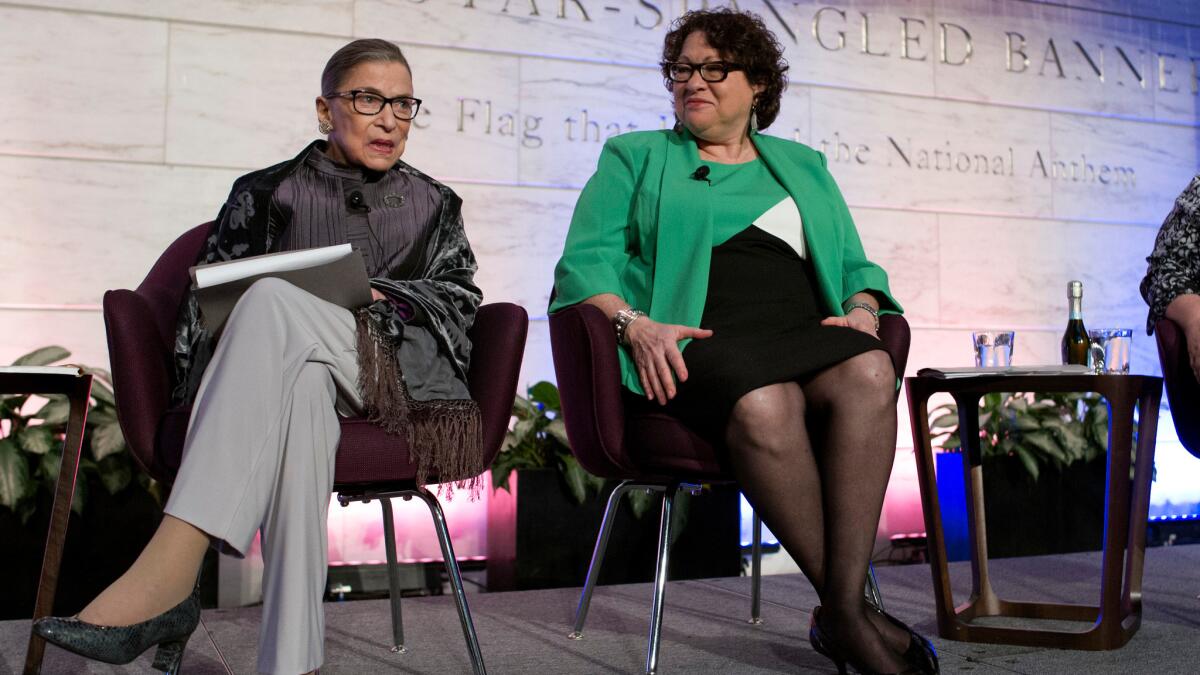Op-Ed: The conservative era of the Supreme Court is over

- Share via
After 45 years with a conservative majority, the Supreme Court appears to be entering a very different era.
The major rulings of this just-completed Supreme Court term show there are no longer five votes for a conservative result — a historic shift. From the time President Nixon’s fourth court nominee was confirmed in 1971 until Justice Antonin Scalia’s death in February, there have always been five ideologically conservative Republican appointees on the bench. No longer. Indeed, if Hillary Clinton is elected president in November, a liberal majority may dominate the court for decades to come.
The decisions over this term might have looked like a mixed bag of liberal and conservative outcomes. But a clear pattern was at work. When Justice Anthony M. Kennedy joined with Justices Ruth Bader Ginsburg, Stephen G. Breyer, Sonia Sotomayor and Elena Kagan, they formed a liberal majority. When Kennedy voted with the conservative bloc — Justices Clarence Thomas and Samuel A. Alito Jr. and Chief Justice John G. Roberts Jr. — the court almost always split 4-4.
When there is a deadlock, the lower court ruling is affirmed, but without setting any Supreme Court precedent. So some ties upheld a liberal result and others a conservative one. For example, the 4-4 tie in Friedrichs vs. California Teachers Assn. means that the government can continue to require employees to pay the share of the union dues that support collective bargaining — an enormously important win for unions and their role in the political process. By contrast, the tie in United States vs. Texas means that President Obama’s program to shield millions of undocumented immigrants from deportation remains shut down while it goes back before the lower courts.
Still, the conservative justices only rarely gained a fifth vote for their position.
After 45 years of a conservative majority, we’ve just gotten a glimpse of what the next era on the court could look like.
In key cases, Kennedy joined the liberals. As a result, the court, 5-3, declared unconstitutional a Texas law that imposed such onerous restrictions on abortion providers that 75% of facilities would have had to close. The decision strongly indicates that many other state laws restricting abortion are likely to be declared unconstitutional. In Fisher vs. University of Texas, Austin, Kennedy wrote the majority opinion upholding the university’s ability to consider race and ethnicity in admissions. Indeed, the tone of Kennedy’s opinion signaled newfound willingness on the court to allow affirmative action programs: “Considerable deference is owed to a university in defining those intangible characteristics, like student body diversity, that are central to its identity and educational mission.”
The only major case in which the conservatives prevailed was Utah vs. Strieff, which held that evidence obtained after an illegal police stop is admissible in court if the police discover an outstanding warrant for the person’s arrest. Breyer joined Thomas, Roberts, Kennedy and Alito to create the majority. Make no mistake — this is a significant and troubling decision, one that gives the police an incentive to stop people without any probable cause, in violation of the 4th Amendment.
But Utah vs. Strieff was the exception in a term in which conservatives time and again could not secure a fifth vote. This could be the dynamic for years to come. In addition to Scalia’s seat, the next president likely will fill several vacancies. Since 1960, Supreme Court justices have left the bench at an average age of 79. There will be three justices 79 or older in 2017: Ginsburg, Kennedy and Breyer. The next president, especially if he or she is a two-term president, likely will have several picks for the high court.
After 45 years of a conservative majority, we’ve just gotten a glimpse of what the next era on the court could look like. No longer are there five conservative votes on abortion and affirmative action. By next year there may be five liberal votes on issues such as campaign finance, the death penalty and gun control.
Erwin Chemerinsky is dean of the UC Irvine School of Law.
Follow the Opinion section on Twitter @latimesopinion or Facebook
More to Read
A cure for the common opinion
Get thought-provoking perspectives with our weekly newsletter.
You may occasionally receive promotional content from the Los Angeles Times.










